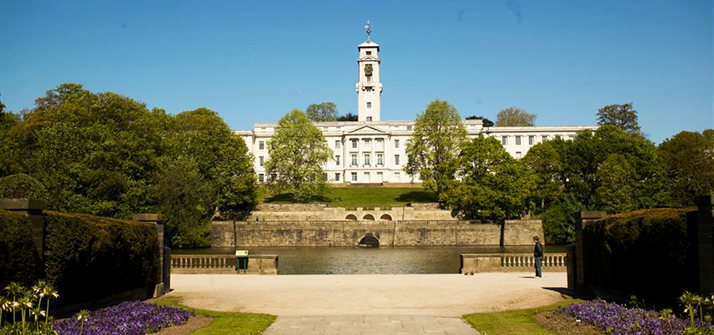September 7, 2018, by Prof Meghan Gray
Questions I wish I’d known the Answer to as a First Year Undergraduate
If I only knew then what I know now…..
In this guest post, recently graduated student Jake Lester shares his advice for new and prospective students. Jake has just started a position as a Information Systems Engineer at BAE Systems (where he was previously a summer intern).

If you’re reading this, you might be considering or starting a Physics degree at The University of Nottingham. That’s great if so, and if not I hope you really consider it! However, you might have a lot of questions about the course, the university as a whole, finance, etc. The best people and places to ask these questions to are staff and students at open days or applicant days, but failing that, I hope this blog post is a good substitute. After four years of studying for (and graduating with) an MSci degree in Physics I’ve learnt a lot more about the universe and the world around us, but also a lot about different aspects of university, and, myself. I hope the following advice will help some of you, even if it’s a small number:
What’s physics like as a degree?
As you can probably guess, Physics is a hard degree. But please don’t let that put you off! I came to university from a standard comprehensive in Leeds, having not studied either Computing or Further Maths at A-level, which I thought would leave me at a big disadvantage. I remember one of my first lectures where the lecturer asked who had done either at A-level; it seemed like half the lecture theatre said they had some experience programming and the other half said they had done Further Maths. However this really wasn’t a disadvantage. They followed up by telling us that the School brings everyone to the same level in First Year, working with the Maths department and running its own ‘Computing for Physical Sciences’ module to help you learn to code. You’re also constantly in contact with your tutor, an assigned staff member who you can go to for academic and pastoral support, and your tutor group – a group of your peers – so everyone is in the same place regardless of your pre-university background. It’s also a really interesting degree as you’re learning about the most fundamental aspects of our universe, which is quite humbling. Throughout my degree, a few of the topics/modules that have come up are: Classical Mechanics, Quantum Mechanics, Atoms and Photons, Magnetic Resonance Imaging, Nanoscience, and even Theoretical Elementary Particle Physics.
Will I be smart enough?
The key to doing well is to work hard, and use the help that’s offered to you. If you have a good work ethic, and complete the assigned problem sheets, coursework, and other questions, then you’ll succeed. It’s a bit like cooking: when you first cook a new meal you constantly look at the recipe, but after a few tries you’ll do it from memory. It’s a similar situation with physics and maths – learn the concepts, practice and do more questions, and it’ll become easier and easier. Nottingham also has a great ‘open-door’ policy, which means most lecturers will be happy to help you if you just turn up to their office door. If you’re struggling, go and use the help available and see your lecturers/tutor, as they want you to succeed as much as you do.
What about lab experiments?
At Nottingham, there is a compulsory laboratory module in the First Year named ‘Introductory Experimental Physics’, which is pretty much what is says on the tin. The module introduces you to experimental physics as a whole, including how to write and keep a professional lab diary, how to plan for experiments and how to write formal reports. These skills are crucial for any prospective physicist or scientist, and also have a lot of transferable skills to other roles as well. The module is carefully structured, and you are paired with a fellow First Year for a certain number of experiments before rotating to someone else, meaning it’s a chance to meet some of your fellow students. I really liked the module!
How am I assessed?
There’s a range of assessment, which is good because it isn’t all weighted on just how well you perform on one particular day. As with high school and A-levels though, you’ll be assessed for a majority component of most modules by end of year exam(s). Other components include weekly coursework, class tests (exams where you can use your notes, but only in exam conditions), articles, and formal reports and diaries for lab modules.
What about higher years?
I wouldn’t worry too much about the structure of the higher years in your First Year! But if you are curious, you do a broader range of topics in your second year regarding core physics concepts, and in your third and fourth year you get the chance to choose particular modules that you might be interested in, such as astrophysics or medical physics.
What are lectures like?
Pretty similar to classes in high school to be honest, only with about 6 times the amount of people. B1 in the Physics Building is where you’ll have most of your first year lectures. It can hold over 300 people, but you have screens at the back of the room, Wi-Fi, and projectors at the front.
If you have some non-physics related questions, I’ve answered a few below:
Who do I go to about finance and accommodation worries?
Besides your personal tutor within the School of Physics, there’s also Student Services. You can go to them for any other general university worries, and there’s also the Student Union itself, which is run by students for students.
What’s Nottingham like as a city?
The best way I can describe it is like a dense, small city. Leeds is quite a wide and large city, and Nottingham is a little smaller and more compact than Leeds. The public transport in and out of town is very cheap for students, and there are a large variety of bars/pubs, music venues, independent shops/cafes, clubs, and Wetherspoons (for cheap food and pints). There’s a straight road from the campus to the city which most students live on in higher years (known as Derby Road and Lenton if you’re interested). In short, it’s a vibrant city that makes you feel at home – I’ve loved living in Nottingham during my time at university.
What are societies?
Societies are organisations that are run by students, for students, that are affiliated to the University of Nottingham Students’ Union. Nottingham has over 200 of them, ranging from charities and faith based ones, to course based and sports based ones. Obviously I am a little bit biased and think the Physics Society (PhysSoc) are the best one (we did win best society in 2015!), but there is almost certainly a society for you to get involved in, and meet new people. My best advice is don’t be afraid, jump in and take the bull by the horns, you’ll thank yourself later on for it.
Is there a Quidditch Society?!
Any final advice?
Be yourself, be friendly, be kind, and most importantly, enjoy yourself. Everyone you meet in First Year will be in exactly the same boat as you, trying to make sense of the new environment around them, so try and make sense of it with them.
And as you’ll probably hear from some of your lecturers, university is 50 % working hard and 50 % having fun. You can’t have one without the other. This is your time, so use it wisely, and make the most of it – work hard, but play hard too.
Good luck!
Jake

No comments yet, fill out a comment to be the first

Leave a Reply